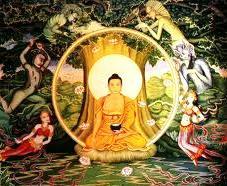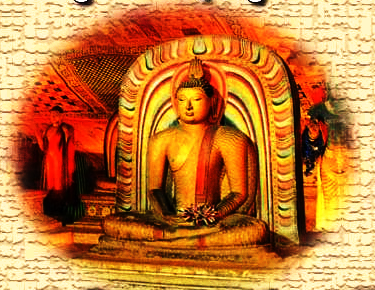Buddhism: The Way of Life
Posted on June 16th, 2011
Article 8
Buddhism and Daily Life
Buddhists learn to view life realistically, which enables them to adjust to anything that comes their way.ƒÆ’-¡ƒ”š‚ Buddhism recommends a code of conduct, supported by cogent reasons, by which we should live our daily lives.ƒÆ’-¡ƒ”š‚ It clarifies what the BuddhistƒÆ’‚¢ƒ¢-¡‚¬ƒ¢-¾‚¢s attitude should be to specific matters; such as self, school, job, and the society.ƒÆ’-¡ƒ”š‚ Thus, Buddhism assists us in living a wholesome life with fundamental adjustments, which will enable us to be happy and adjusted to the word, our occupations, family, and fellow beings.
Buddhism teaches us to see things as they really are.ƒÆ’-¡ƒ”š‚ This allows us to understand the instability and impermanency of everything.ƒÆ’-¡ƒ”š‚ Adherence to such would strive us to be insulated from potential disappointments.ƒÆ’-¡ƒ”š‚ Buddhists should not be unduly elated or upset by the eight worldly conditions: gain and loss, honour and dishonour, praise and blame, pleasure and pain.ƒÆ’-¡ƒ”š‚ Such a person will not expect much from others or from life and will recognize that it is only human to have oneƒÆ’‚¢ƒ¢-¡‚¬ƒ¢-¾‚¢s share of lifeƒÆ’‚¢ƒ¢-¡‚¬ƒ¢-¾‚¢s ups and downs.
The inner development of character, attitude, and wisdom is nurtured by the practice of Dhamma. A Buddhist looks at lifeƒÆ’‚¢ƒ¢-¡‚¬ƒ¢-¾‚¢s events in terms of Cause and Effect, however unpleasant or painful they may be.ƒÆ’-¡ƒ”š‚ ƒÆ’-¡ƒ”š‚ An understanding layman accepts dukkha as the result of his own kamma, probably a past unskilful (akusala) action ripening in the present.
Buddhist Principles
Buddhism is different from other religions in that it essentially signifies tolerance and accommodation, and does not denounce any other religion.ƒÆ’-¡ƒ”š‚ Buddhism teaches the natural Truth, which is eternal and indestructible.ƒÆ’-¡ƒ”š‚ Furthermore, no wars have been fought in the name of Buddhism.ƒÆ’-¡ƒ”š‚ In Buddhism, compassion is expressed as sharing, giving comfort, empathy, caring, and concern.ƒÆ’-¡ƒ”š‚ Buddha is not a god; idol worship is not part of Buddhism, although Buddhists pay respect to the Lord Buddha.ƒÆ’-¡ƒ”š‚ This in part is due to the Confidence (shraddha, saddha; shradhaƒÆ’†’ƒ”š‚£wa) Buddhists having in the Buddha, Dhamma, and Sangha.ƒÆ’-¡ƒ”š‚ What matters is the adherence to the Dhamma and regular practice of meditation.
The Five Buddhist Precepts teach us to refrain from taking the life of any living thing; refrain from taking anything that is not freely given; abstain from sexual misconduct and sensual overindulgence; refrain from untrue speech; and abstain from all intoxicating agents.ƒÆ’-¡ƒ”š‚ Observation of each of these Precepts enables one to lead a basic trouble-free life; the Way of Life.ƒÆ’-¡ƒ”š‚ The Buddha said ƒÆ’‚¢ƒ¢-¡‚¬ƒ…-ehi–passiko,ƒÆ’‚¢ƒ¢-¡‚¬ƒ”š‚ which means ƒÆ’‚¢ƒ¢-¡‚¬ƒ…-come and see.ƒÆ’‚¢ƒ¢-¡‚¬ƒ”š‚ƒÆ’-¡ƒ”š‚ Buddhism is not a fixed package of beliefs to be accepted in its entirety.ƒÆ’-¡ƒ”š‚ Buddha said, before believing anything, test, question, and experience it yourself. ƒÆ’-¡ƒ”š‚ Consequently, the Buddha asked his followers to first verify his teachings and then decide for themselves.ƒÆ’-¡ƒ”š‚ Individuals should take responsibility for their own actions.
BuddhaƒÆ’‚¢ƒ¢-¡‚¬ƒ¢-¾‚¢s Teachings
The first sermon of the great Buddha gives a clear picture for our day-to-day lives.ƒÆ’-¡ƒ”š‚ His teachings include the Middle Path, Four Noble Truths, and the Noble Eightfold Path, guiding us to live a safe and peaceful life.ƒÆ’-¡ƒ”š‚ Moreover, the Four Noble Truths and the Noble Eightfold Path signify the day-to-day lives of all of us in that they direct us on how to overcome negative and evil actions by Right View and Right Actions (please refer to articles 1 and 2 in this series).ƒÆ’-¡ƒ”š‚ We will discuss this in detail in future article.
The Middle Path of avoiding extremes is applicable to every situation in our lives.ƒÆ’-¡ƒ”š‚ Such teachings point out the way to protect others and ourselves by taking Right Thinking, Right Action, Right Views, and having Right Understanding, which include open discussions tolerance, and peaceful proactive actions.
Questions about Life and Death are everlasting in the human mind.ƒÆ’-¡ƒ”š‚ Buddhism advocates meditation, which helps to overcome negative mental conditioning and enables a person to realize the Truth within himself or herself.ƒÆ’-¡ƒ”š‚ Buddhism, when properly practiced, leads to Wisdom, as opposed to fear and greed.ƒÆ’-¡ƒ”š‚ In the first sermon of the Buddha guided us to live in a righteous way in a productive manner without harming anyone including animals, and in harmony with the environment. ƒÆ’-¡ƒ”š‚ However, those who preach must also practice the teachings; if not, the listeners would develop a negative impression.ƒÆ’-¡ƒ”š‚ Laypeople who provide unnecessary luxuries and create a luxuriant atmosphere for monks must also accept primary responsibility for putting some monks on the negative path.
Incorporating Materialism into Buddhism
Most people are driven by some basic material needs.ƒÆ’-¡ƒ”š‚ Once these are met, some go further seeking deliverance.ƒÆ’-¡ƒ”š‚ In some societies, Buddhist teachings are integrated to satisfy the material and social needs of the population.ƒÆ’-¡ƒ”š‚ In Mahayana Buddhism, societal and social needs are emphasized much more than in Theravada Buddhism.ƒÆ’-¡ƒ”š‚ Over the years, Theravada schools also began to emphasize on societal and social needs. However, in
countries such as Sri Lanka, this tradition seems to have lost its emphasis on practice, in part due to colonializations.ƒÆ’-¡ƒ”š‚ Mahayana Buddhism has much more rituals than does Theravada Buddhism.
Many Theravada Buddhist countries are classified as poor by economic standards.ƒÆ’-¡ƒ”š‚ Most of these countries also suffered extended occupation by Colonial powers, and also lack vital natural resources.ƒÆ’-¡ƒ”š‚ Nevertheless, these countries are rich in generosity and spiritualism.ƒÆ’-¡ƒ”š‚ Some critics link this poverty (lack of materialistic ability, tangible wealth, and benefits) with the Buddhist teachings regarding wealth: namely, wealth does not guarantee happiness, and everything is impermanent.ƒÆ’-¡ƒ”š‚ On the other hand, several studies have reported that the underlying attitudes of people, and not Buddhist beliefs, are the major reasons for continuation of poverty.
Duties of Buddhist Clergy
The primary duties of a Buddhist monk include A). Practice of meditation for self-gain, B). Educating laypeople to practice meditation and understand Dhamma, and C). Dissemination of the Dhamma.ƒÆ’-¡ƒ”š‚ They should also take the initiative of educating the lay public to engage in Dhamma and meditation, and to minimize rites and rituals.ƒÆ’-¡ƒ”š‚ The Buddha discouraged monks, the collection of and passion for valuables and money.ƒÆ’-¡ƒ”š‚ Nevertheless, this has become a common occurrence in todayƒÆ’‚¢ƒ¢-¡‚¬ƒ¢-¾‚¢s life, in part because of rising global materialism and also devoteesƒÆ’‚¢ƒ¢-¡‚¬ƒ¢-¾‚¢ (dayakayasƒÆ’‚¢ƒ¢-¡‚¬ƒ¢-¾‚¢) willingness to provide (inappropriate) luxuries to monks.ƒÆ’-¡ƒ”š‚ How these attitudes and actions will affect the trust and reverence placed on the clergy in the long term and Buddhism in general is yet to be determined.
How Materialism Invades Institutions
The question of relationships between the laity and the clergy (Sangha) is another important aspect of Buddhism.ƒÆ’-¡ƒ”š‚ Craving and the desire for wealth and materialistic things are to be abstained from, because that is the path to the continuation of suffering.ƒÆ’-¡ƒ”š‚ It is somewhat ironic that in recent years the basic amenities in temples have been replaced with ultramodern infrastructure items and luxuries that even most laypeople do not have.ƒÆ’-¡ƒ”š‚ Such things are in fact prohibited, not only by the Ten Precepts, but also by the Vinaya Pitaka (discourse).ƒÆ’-¡ƒ”š‚ A dhana offered to monks is supposed to be a simple and straightforward affair.ƒÆ’-¡ƒ”š‚ However, today such events often include a menu list that is sent to the monks for approval, or some monks send a menu or list of items to be prepared by the dayakas.ƒÆ’-¡ƒ”š‚ Some dhanas are even set up like buffets.ƒÆ’-¡ƒ”š‚ Whereas, simplicity and frugality should be the norm.
Moderation and simplicity are encouraged in the doctrine.ƒÆ’-¡ƒ”š‚ For example, the Buddha encouraged pindapatha by monks, which has many benefits, including visible simplicity, openness, and frugality.ƒÆ’-¡ƒ”š‚ This practice assures the poor and rich alike to offer dhana and pave the path to maintaining traditions, with the continued participation of future generations.ƒÆ’-¡ƒ”š‚ Additional benefits of pindapatha include exercise and good health, and perhaps longevity of life for monks.ƒÆ’-¡ƒ”š‚ Such practices would be particularly applicable today, especially considering the benefits of walking in reducing the widespread increase in the incidences of obesity and type 2 diabetes.
BuddhaƒÆ’‚¢ƒ¢-¡‚¬ƒ¢-¾‚¢s Message
Everlasting happiness cannot be purchased or obtained by self-indulgence or self-mortification.ƒÆ’-¡ƒ”š‚ On the other hand, avoiding extremes and following the Middle Path will lead to peace of mind, tranquility, wisdom, and eventual liberation from suffering and the dissatisfaction of life.ƒÆ’-¡ƒ”š‚ Achieving peace of mind is not a strenuous job but should be an effortless process.
Eliminating unwholesome states and developing wholesome thoughts and actions are a part of the transcendent goals.ƒÆ’-¡ƒ”š‚ Nibbana, the calm and quiescent state of mind, can be achieved only by full and clear comprehension of the nature of things and the mode of existence of all phenomena.ƒÆ’-¡ƒ”š‚ Although this reality has to be penetrated by direct experience, Buddhist teachings have given us a set of specific guidelines to understand and follow.ƒÆ’-¡ƒ”š‚ In Buddhist philosophy, obliteration of ignorance, the primary root of all bondage and suffering, has been identified clearly as the path to achieving wisdom.ƒÆ’-¡ƒ”š‚ This is applicable to all of us.
Buddhism provides and encourages complete freedom and reasoning for an individual.ƒÆ’-¡ƒ”š‚ Buddha did not impose any religious laws or commandments for people to obey.ƒÆ’-¡ƒ”š‚ He did not establish a set of punishments for those who violate religious principles or condemn anyone who did not follow his advice; it is the individualƒÆ’‚¢ƒ¢-¡‚¬ƒ¢-¾‚¢s choice.ƒÆ’-¡ƒ”š‚ In other words, He never adopted a carrot-or-stick approach.ƒÆ’-¡ƒ”š‚ Instead, He upheld the freedom of the individual and the freedom of choice and equality, encouraging reasoning and self-investigation of facts.ƒÆ’-¡ƒ”š‚ His guidance has geared us to develop self-understanding, self-confidence, and self-reliance, which lead to the elimination of fear, greed, and hatred.ƒÆ’-¡ƒ”š‚ Elimination of these evils is essential to sustaining happiness.
Fools, men of little intelligence, give themselves over to negligence, but the wise man protects his diligence as a supreme treasure (Dhammapada)
Note: Some of the material, pictures, poems, and stanzas in these writings may have been published previously, including on the Internet (such as http://what-buddha-said.net and Buddha.direct.net) or obtained from various sources (modified with permission).ƒÆ’-¡ƒ”š‚ The author sincerely thanks all contributors of such materials for their generosity. We anticipate that the brief articles on meditation, Buddhism, and Buddhist philosophy that appear in this column will initiate healthy and positive discussions.
May the Noble Triple Gem bless you
Sunil J. Wimalawansa
Professor of Medicine, Endocrinology, Physiology & Integrative Biology





